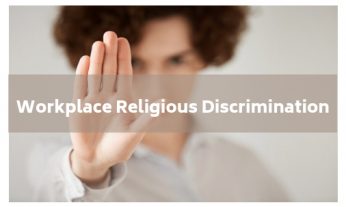 Workplace religious discrimination does not pay in California. Is America a Great Melting Pot or a Cultural Stew? Regardless of how you view the enormous collection of cultures, ideas, and religions in this country, the legal protections for differences are alive and well. When it comes to religious differences, federal and California law join to protect all Americans, regardless of faith. If your employer fails to recognize your religious rights under the law, a conversation with a local employment attorney could prove useful.
Workplace religious discrimination does not pay in California. Is America a Great Melting Pot or a Cultural Stew? Regardless of how you view the enormous collection of cultures, ideas, and religions in this country, the legal protections for differences are alive and well. When it comes to religious differences, federal and California law join to protect all Americans, regardless of faith. If your employer fails to recognize your religious rights under the law, a conversation with a local employment attorney could prove useful.
Legal Requirements and Workplace Religious Discrimination
Title VII of the Civil Rights Act of 1964 requires employers to make reasonable accommodations for the religious beliefs of employees. This law, in conjunction with California’s Fair Employment and Housing Act (FEHA) provide significant religious protections for employees.
FEHA’s requirements ask employers to make reasonable accommodations for religious reasons, provided the accommodation does not lead to the segregation of employees based on religious affiliation. Such accommodations would be expected to include:
- Changes in work schedules in order to accommodate religious holidays or observances;
- Adjusting dress and grooming standards;
- Allowing for private prayer time during the workday as prescribed by the religion.
Proving an Accommodation Causes Undue Hardship for the Company
It is not necessary to make adjustments to company policies and procedures if those adjustments would result in undue hardships. Those hardships will be evaluated considering several factors, including:
- Nature of the accommodation;
- Costs required;
- Resources of the company;
- Size of the facility;
- Geographic factors.
Workplace Religious Discrimination 2018 Lawsuit
One California business discovered just how serious it is for companies to decline to make the religious accommodations required by law. While making the adjustments would have been a minor adjustment for a single employer, their decision to resist working with that employee wound up costing them more than they bargained for.
Learning a Lesson on Workplace Religious Discrimination
Universal Protection Services is a private security company that provides services for a number of California businesses. When a security guard requested modifications to the compulsory grooming standards set forth by the company based on his Muslim religious convictions, the company refused to make an exception. Just days following his entreaty, the employee was fired, according to the Equal Employment Opportunity Commission (EEOC).
The employee filed a complaint with the EEOC, and the legal wheels started turning. Universal refused to agree to any settlement in the case, and after enduring litigation, was required to make a number of concessions, in addition to having to fork over 90K.
- They were required to work with an EEOC monitor, whose task it was to appraise and modify company policies with regard to religious accommodations, to ensure company guidelines were in accordance with Title VII laws;
- They were obliged to provide annual employee and manager trainings regarding EEOC requirements;
- They were told to post a notice informing employees of religious rights under EEOC rules;
- They were expected to record instances of religious discrimination complaints and issues and report those situations to the EEOC.
Fighting for Religious Rights
If your workplace religious rights are being trampled on in Sonoma County, Mendocino County, or Lake County California, the experienced and dedicated employment law attorneys at Beck Law P.C., can help. Contact us in Santa Rosa for a confidential consultation today. Beck Law P.C., is located at 2681 Cleveland Avenue, just south of the Empire College School of Law and north of Coddingtown Mall.
